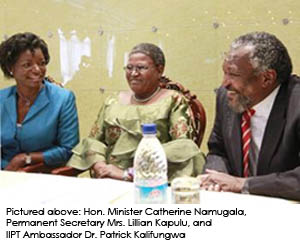 Minister of Tourism, Environment and Natural Resources, Zambia, Hon. Catherine Namugala has officially launched the 5th IIPT African Conference: Meeting the Challenges of Climate Change to Tourism in Africa and the Developing World to be held in Lusaka, Zambia 15 – 20 May, 2011.
Minister of Tourism, Environment and Natural Resources, Zambia, Hon. Catherine Namugala has officially launched the 5th IIPT African Conference: Meeting the Challenges of Climate Change to Tourism in Africa and the Developing World to be held in Lusaka, Zambia 15 – 20 May, 2011.
In launching the Conference, Minister Namugala said, “The Zambia Government is proud to be hosting the conference as the theme is very appropriate to Africa, and Zambia in particular, because the effects of climate change are exerting a heavy toll on the entire life chain.”
“It is worth noting that climate change is a major threat to sustainable growth and development in Africa, and the achievement of the Millennium Development Goals. Impacts of climate change include among others, increased incidence of both drought and flooding, desertification, sea level rise, reduced freshwater availability, decreasing fish resources, cyclones, impacts on food security, all of which have an impact on tourism,” Minister Namugala said.
“Climate change is the pre-eminent geopolitical and economic issue of the 21st century. It rewrites the global equation for development, peace, and prosperity.” U.N. Secretary-General Ban Ki-moon, 2009 Summit on Climate
The aim of the 5th IIPT African Conference is to showcase models of ‘best practice’ in mitigating and addressing the anticipated impacts of climate change to tourism in Africa and the developing world.
The Conference is being organized by International Institute for Peace through Tourism (IIPT) in partnership with the UN World Tourism Organization (UNWTO), Pacific Asia Travel Association (PATA), Regional Tourism Organization of Southern Africa (RETOSA) and The Blue Yonder.




Other partners include Livingstone International University of Tourism Excellence and Business Management (LIUTEBM); Zambia Ethno Tourism and Cultural Tourism Alliance (ZECUTA); and The Children’s and Youth Welfare Foundation of Zambia.
To register, please click here.
Topics to be Addressed
• Sustainable Strategies and Practices from Diverse Regions
• Perspectives on Sustainable Destinations
• The Human Dimension of Climate Change
• Preserving Bio-diversity for Future Generations
• Returns on Investment from Conservation Practices
• Strategies for Marketing and Tourism Investment
• Climate Change: Policy and Planning to Practice
• The Central Role of Parks and Wilderness Areas
• Traditional Approaches to Preserving Bio-diversity
• Multimedia Approaches to Promote Public Awareness
• Coastal Tourism Strategies and Water Management
• Mitigating the Driving Factors of Climate Change
• Forums for Responsible Travel and Tourism
• Setting Standards and Business Models for Sustainable Tourism
Participants
The 5th IIPT African Conference will bring together leading experts in tourism and climate change, Ministers of Tourism and the Environment, senior government officials, and executives from the diverse sectors of the industry; UN agencies, donor agencies, and NGOs; researchers, policy-makers, and practitioners; representatives of related sectors, including environment, culture, and sustainable economic development; and leading academics to share their knowledge and experience and research related to climate change response strategies, programs and actions in Africa and developing countries throughout the world.
Timeliness and Importance of Conference
The year 2010 ranked as the warmest on record, together with 1998 and 2005. The 10 warmest years on record have all occurred since 1998. Arctic sea-ice cover in December 2010 was the lowest on record. Last year also witnessed a large number of extreme weather events, including an extreme heat wave in Russia and devastating floods in Pakistan. This year has begun with extreme flooding in Sri Lanka, flash flooding near the Brazilian city of Rio de Janeiro, and severe flooding in eastern Australia, expected to be the most costly natural disaster in Australia’s history.
Although African and other developing nations are least responsible for climate change, they are particularly vulnerable to the effects, including reduced agricultural production, threats to food security, increased incidence of both drought and flooding, sea level rise, coastal erosion, coral bleaching, deforestation, loss of wildlife, reduced fresh water availability, spread of malaria and other disease, and an increased risk of conflict over scarce land and water resources.
Background
 In 2007, the UN World Tourism Organization (UNWTO), jointly with the United Nations Environment Programme (UNEP) and the World Meteorological Organization (WMO), with the support of the World Economic Forum (WEF) and the Swiss Government, convened the Second International Conference on Climate Change and Tourism, in Davos, Switzerland, with the aim of responding to climate change imperatives in the tourism sector. The conference set out a range of specific policies and actions to be taken by all stakeholders in the tourism sector to immediately begin to establish and implement a long-range, carbon-neutral roadmap.
In 2007, the UN World Tourism Organization (UNWTO), jointly with the United Nations Environment Programme (UNEP) and the World Meteorological Organization (WMO), with the support of the World Economic Forum (WEF) and the Swiss Government, convened the Second International Conference on Climate Change and Tourism, in Davos, Switzerland, with the aim of responding to climate change imperatives in the tourism sector. The conference set out a range of specific policies and actions to be taken by all stakeholders in the tourism sector to immediately begin to establish and implement a long-range, carbon-neutral roadmap.
The 5th IIPT African Conference will seek to identify actual ‘on-the-ground’ progress since the 2007 Conference with case studies of ‘best practice’ from each of the developing regions of the world and from governments, destinations, industry sectors, NGOs, researchers and academics, and the media.
Official Airline and Hotel 
 South African Airways is the official carrier for the conference andthe Hotel InterContinental Lusaka is the official hotel and conference venue.
South African Airways is the official carrier for the conference andthe Hotel InterContinental Lusaka is the official hotel and conference venue.
For more information and to register, please click here.


No comments:
Post a Comment